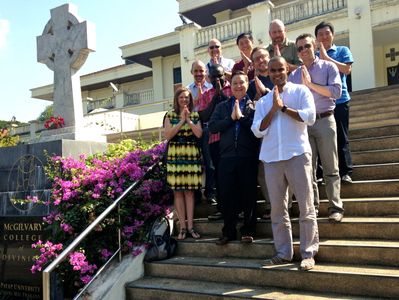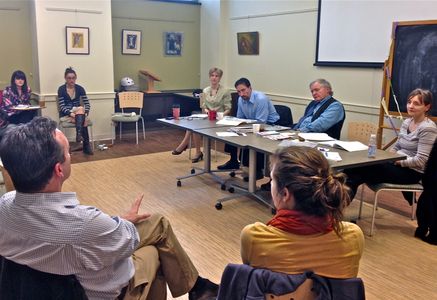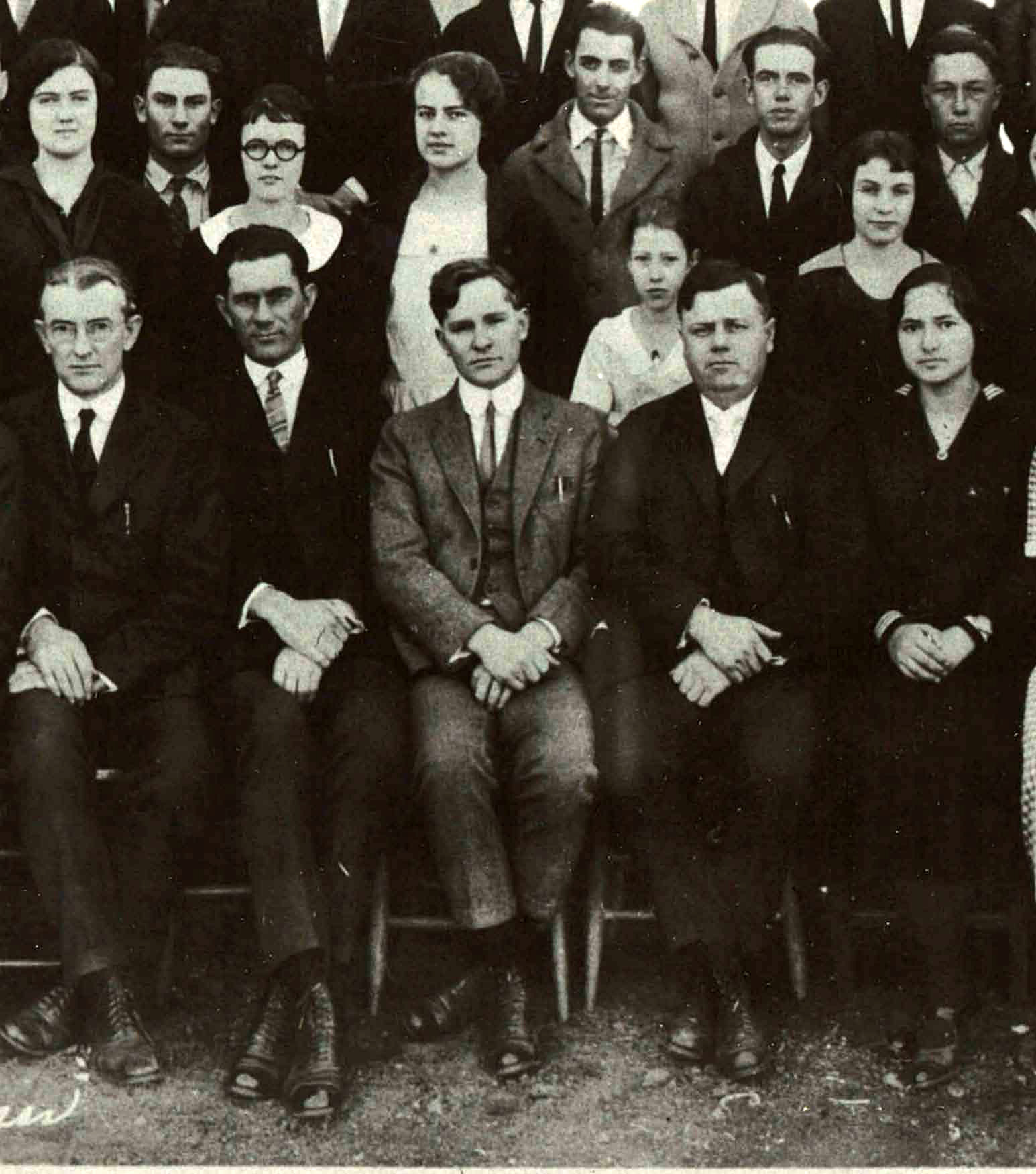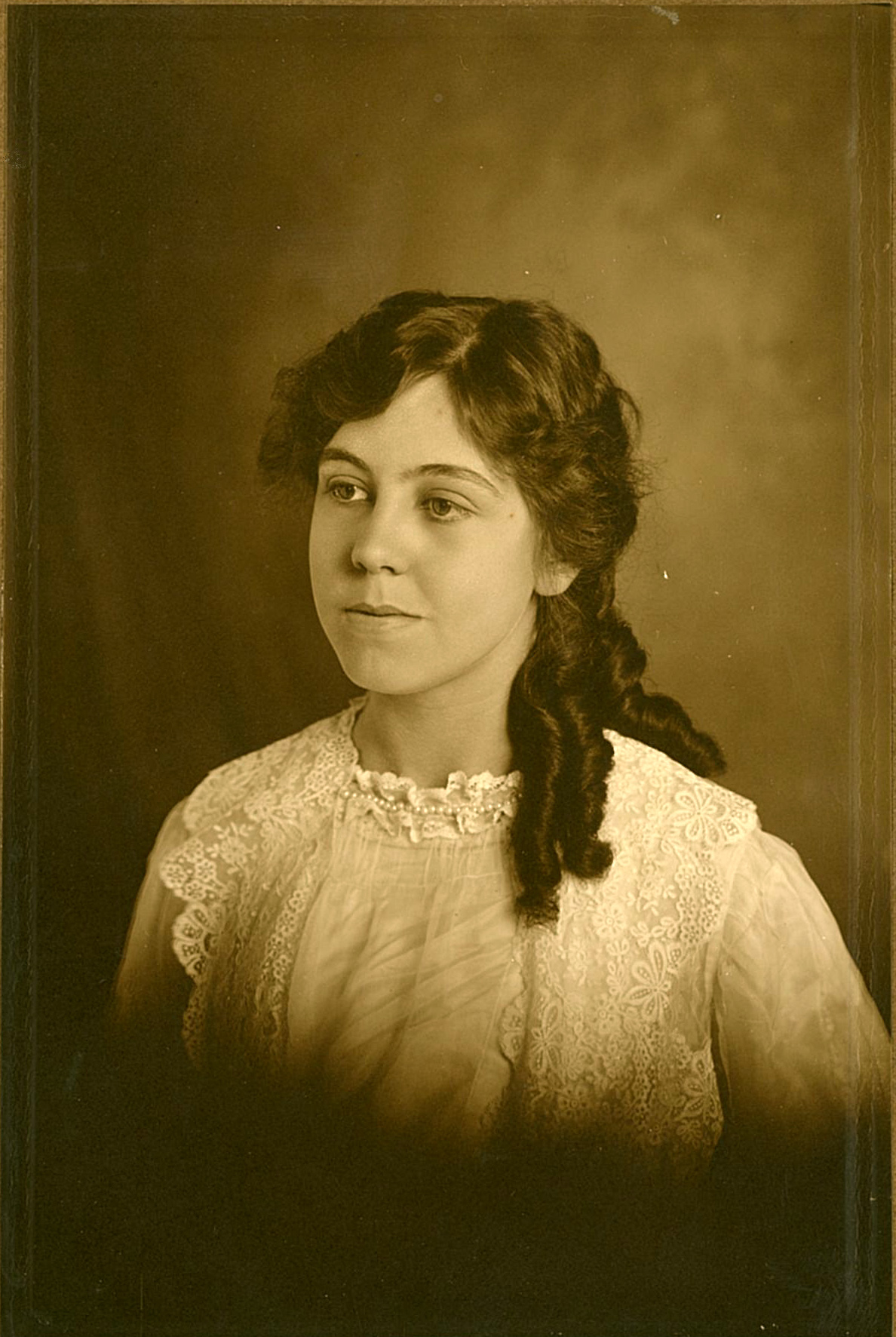Religion & Development
Globally, religious people and communities have been deeply involved with alleviating human suffering and meeting basic human needs since the earliest days of mission. Furthering our understanding of how this happens and enhancing the ability of practitioners to work in this context are important goals of the CGCM.
Education as a Mission
Education as a Mission
The Greatest Work in the World: Education as a Mission of Early Twentieth
Century Churches of Christ. Letters of Lloyd Cline Sears and Pattie Hathaway Armstrong
The Stone-Campbell Connection
Influences of Stone-Campbell Movement leaders on the writers of these letters are several and strong, beginning with Pattie Hathaway’s grandfather, James A. Harding. In 1869, Harding graduated from Bethany, a rigorous, private college near the Allegheny Mountains founded by Alexander Campbell. Although Campbell had died before Harding enrolled, his educational philosophy still influenced that institution.[2] Harding particularly absorbed Campbell’s emphases on propagating widely-accessible, liberal arts-based training overseen by well-equipped teachers who could guide students in their “physical, intellectual and moral development.”[3] Scholars have observed that this model established the parameters for Churches of Christ educational institutions and Campbell’s influence in this regard is evident in The Greatest Work in the World.
Additionally apparent in the letters is the inspiration of Barton W. Stone, Campbell’s Kentucky-based colleague who may be best known for his leadership in the famous Cane Ridge Revival of 1801. The intellectual foundations on which Stone based his teachings about personal piety are less well remembered today. But traces of his skepticism about modern “progress;” his emphases on spiritual maturity accompanied by ethical actions; and his allegiance to powers beyond those of civil governments[4] are clearly discernable in this volume of correspondence.
This work originates from a family prominent in the Churches of Christ from the mid–1800s through the 1960s. Letters exchanged principally between my grandparents, Lloyd Cline Sears and Pattie Hathaway Armstrong, constitute the bulk of the work. Augmenting their posts are letters from family members J. N. and Ida Woodson (Harding) Armstrong and Pattie (Cobb) Harding, wife of James A. Harding. Written between 1915 and 1921 these letters express an educational philosophy and understanding of Christian purpose inspired by the Stone-Campbell Movement and held in tension with the intellectual and social ferment of the times.
As leaders in “the oldest ecumenical movement in America,”[1] the letter writers helped establish and run a series of small schools throughout the American South, Midwest, and West that influenced generations of students to become teachers, preachers, missionaries, and orphanage directors.
Today, Lipscomb University in Nashville, Tennessee is the oldest establishment in this legacy while Harding University in Searcy, Arkansas has been the institution most closely associated with the letter writers. Correspondence contained in The Greatest Work in the World dates from a time in between the founding of these two schools, when the authors were running Cordell Christian College in Oklahoma and Harper College in Kansas.
This primary source material allows rare access to privately expressed thoughts of men and women attempting to live as Christian educators at the outset of an uncertain and rapidly changing twentieth century. Their letters also offer encouraging lessons for contemporary American Christians in this even more volatile era.
Containing a foreword by Richard T. Hughes of Messiah College and an afterword by Larry R. Long of Harding University, The Greatest Work in the World is available from Wipf and Stock Publishers.
This webpage contains excerpts from the book along with extra material and photographs not found there.
[1] J. D. Murch, Christians Only, Eugene, OR: Wipf and Stock, 2004, 360.
[2] Lloyd Cline Sears, The Eyes of Jehovah, Nashville: Gospel Advocate, 1970, 10.
[3] Thomas H. Olbricht, “Alexander Campbell as an Educator,” Lectures in Honor of the Alexander Campbell Bicentennial, 1788-1988, Nashville: Disciples of Christ Historical Society, 1988, 85.
[4] Richard T. Hughes, Reviving the Ancient Faith: The Story of Churches of Christ in America, Grand Rapids: Eerdmans, 1996, 92
Elizabeth Cline Parsons, editor
Lecturer on Religion, Culture, and Development
Faculty Associate, CGCM
It is surprising to me how untaught the people of the country generally are. They have learned a few of the very first principles of Christianity and are blinded to all the rest. . . . And so bad is this condition that it will be impossible to change it in one or two generations. The people are not willing to receive the great lessons which they ought to have. . . . Preaching to these brethren might lift them up in two or three generations, but the trouble will be in getting a preacher. All the preachers they would have are the kind which would only emphasize the same condition, and make them worse instead of better. They need someone who can teach to live among them and work and make everyone else work. This can only be done by men trained from their boyhood. And I know of no better place to give boys this training than in a Bible school. We are engaged in the greatest work in the world, and it must go on. Even if you should die the work would have to continue, and I should do my best to carry it on. And I know if I should die you would keep it going; there would still be sufficient—more than sufficient—friends to make it go. And I hope to see it turn out hundreds of preachers, boys and girls, who will make a reformation throughout this whole country [Cline Sears, June 27, 1915]
I am of the opinion you are about our Bible School in the future. . . . In all the history of the school work the schools have been small. The Nashville Bible School is larger to day than it ever has been, but it is losing its spirituality—and we must not do that. The Orphan’s Home must not be large for the same reason. If the Home is crowded I can not have the influence over the children I must have to do what I believe the Lord would want me to do. It would be impossible for me to know each child’s disposition and to know what traits should be encouraged and what traits should be fought and mastered, and, too, I want them to know and love me, but they can not do it if I have too many. [Pattie Hathaway Armstrong, June 21, 1915]
There is a great difference between the people of the world and of the popular churches, and the people of the churches of Christ. Anything that is respectable and respected by society and the world is engaged in by the popular churches. War is not condemned, but is encouraged by the ministers. I heard a prayer recently for the “success of our arms in Mexico,”—which necessarily means the destruction of hundreds of lives and the ruin of hundreds of homes, yet because the world praises it as patriotism the preachers pray for it, and buy flags to lead the army in battle. [Cline Sears, July 17, 1916]
Just before church time I went to the post office just as I told you. The office was empty, so I stood by the window and read your letter in the twilight. I came up the street wishing I could be in a boat on the lake with you when I glanced up and almost caught my breath at the beauty of the scene. Under the trees and among the flowers in Mr. Lee’s yard were hundreds and hundreds of fireflies. I think I have never seen anything more beautiful. The whole world seemed filled with these tiny fairy lanterns. This time I didn’t cry at a beautiful scene. You enjoyed it quite as much as I did. There is quite an advantage in being together though separated, isn’t there? [Pattie Hathaway Armstrong, July 12, 1915]
Click Cordell Christian College Promotional Pamphlets to see some transcriptions of promotional pamphlets produced for Cordell Christian College. The pamphlets provide additional information and perspectives on the viewpoints of the letter writers.
Mission as Development? – The Case of Thailand
 In the last few decades, Christian development has grown so rapidly in some quarters it is almost synonymous with mission. Earlier this year Dr. Todd Johnson led a residency study on religion and development in Chiang Mai, Thailand. Dr. Johnson was assisted by CGCM student associate Eva Pascal. The residency study is part of the World Christianity Doctor of Ministry program through the Gordon Conwell Theological Seminary.
In the last few decades, Christian development has grown so rapidly in some quarters it is almost synonymous with mission. Earlier this year Dr. Todd Johnson led a residency study on religion and development in Chiang Mai, Thailand. Dr. Johnson was assisted by CGCM student associate Eva Pascal. The residency study is part of the World Christianity Doctor of Ministry program through the Gordon Conwell Theological Seminary.
The team of teachers and D.Min. students spent an intense and rewarding two weeks visiting over 20 non-governmental and faith-based organizations in various parts of northern Thailand. These NGOs and FBOs were selected for the range of scale, religious affiliations, and the variety of social, political and environmental issues they addressed. They also included large scale international organizations like ADRA, and local projects like Hope Home, a small house for disabled children. Many of the organizations focused on the challenges facing minority people (called Hill-Tribes) in the areas of education, sexual exploitation, health care, and land rights. Students were able to see first-hand not only some of the central challenges in the region, but how organizations have stepped up to address them, and how faith-based organizations work to integrate mission into their work. The residency was such an overall success that another residency in Thailand on religion and development is in the works for the next residency cohort.
Mission and Development through Non-Profit Service
 Dr. Elizabeth Parsons, Lecturer in Religion and Development and a Resident Scholar with the CGCM, taught an exciting course this spring on the intersection of mission and development. The course, called Enacting Mission Through NGO and FBO Work, covered a variety of issues related to work in non-governmental, non-profit, and faith-based organizations. In the first part of the course, students gained a footing on the history and current functioning of NGOs and FBOs. Thereafter, they not only engaged critically with values and assumptions embedded in the business of development and NGO related work, they also learned practical skills important for the vocation, from money matters to navigating the rough waters of cross-cultural interactions.
Dr. Elizabeth Parsons, Lecturer in Religion and Development and a Resident Scholar with the CGCM, taught an exciting course this spring on the intersection of mission and development. The course, called Enacting Mission Through NGO and FBO Work, covered a variety of issues related to work in non-governmental, non-profit, and faith-based organizations. In the first part of the course, students gained a footing on the history and current functioning of NGOs and FBOs. Thereafter, they not only engaged critically with values and assumptions embedded in the business of development and NGO related work, they also learned practical skills important for the vocation, from money matters to navigating the rough waters of cross-cultural interactions.
The last part of the course engaged future contexts, opportunities, and challenges for NGO and FBO service and leadership in the 21st century. To help with these questions, Dr. Parsons organized a panel for the class, with the support of the CGCM, and invited the STH community to attend. Panelists were chosen for their connections with STH, for their own spiritual and ethical commitment to service work, and to show how theological education would be helpful for a range of service vocations. The panelists included STH alum Rob Gordon, Executive Director of United Way of Kennebec Valley; John Lindamood, Director of Resident Services in the Cambridge Housing Authority, who holds an M.Div. from Harvard and has made presentations at STH in the past; and Paula Kline, Executive Director of the Montreal City Mission, who oversees an organization that is a contextual partner of STH.
The panel, “Enacting Mission Through Non-Profit and Faith-Based Service Work in Unpredictable Times,” took place on April 11, 2014. Dr. Parsons introduced the class and each guest spoke of the paths that brought them to non-profit work, addressed how they integrate spiritual formation and commitment into their vocation, and in the question and answer sessions that followed, shared practical ideas about how to get into non-profit work, and what kind of skills are important.
Theological and pastoral education as laying the foundation for work in social justice and instilling compassionate values, working in partnership, and fundraising tips were just some of the key themes that emerged from the panel and discussion. The STH will look forward to future teaching and discussion on the intersection of mission and development.
A Message from Ted Karpf
CGCM Colleagues
For two years I have been working to bring a new course based on missions work in the HIV/AIDS to STH. This spring it has happened. The advert is below. More importantly, this is the first course with a critical international public health component and one which is field tested in missions round the world. Values and practices is based on my foundational work with the Ford Foundation and WHO on Decent Care. It will look at health and health systems and give a sense of how to understand what is happening in systems and what can change for the patient and family in that system. By enacting agency every one of us can be the manager of our own health care. For those of us in missions it is crucial to understand how each of us can have a say in what happens to people in health care encounters. The course will be driven the class itself with reasonable reading assignments and paper by midterm. The final will be the writing of an Op Ed piece, max 750 words. That should lighten the end of year issues, all to be done before finals week. Cannot figure out how to do this any better. It is a first-run course and we will learn from each other how best to make this work. So I hope you will consider signing up.
Best Always
Ted+
 Course Description
Course Description
Important theoretical and practical issues related to cross-cultural, governmental and nongovernmental and faith-based service work related to the practice of *Decent Care and its application in developing healthy communities will be surveyed.
Structured according a developmental approach to health and health systems, students will be encouraged to think critically about and experience the application of values and assumptions undergirding health systems and structures of such service work as currently envisioned and practiced.
Case studies, guest speakers, and multimedia offerings will enrich the context of informed disciplinary and cross disciplinary approaches.
*Decent Care is a concept developed in the World Health Organization by the instructor. Decent Care bases the planning, delivery and evaluation of care on values that place individuals, in their social and cultural contexts, at the center of the caring process. The aims of decent care are to develop health systems around the primacy of persons in their own health care, and to build a bridge between the principles of human rights and the practice of medicine. By listening to and honoring the voices of the people care processes and models can be developed that respond to the needs of a community enabling human flourishing.







